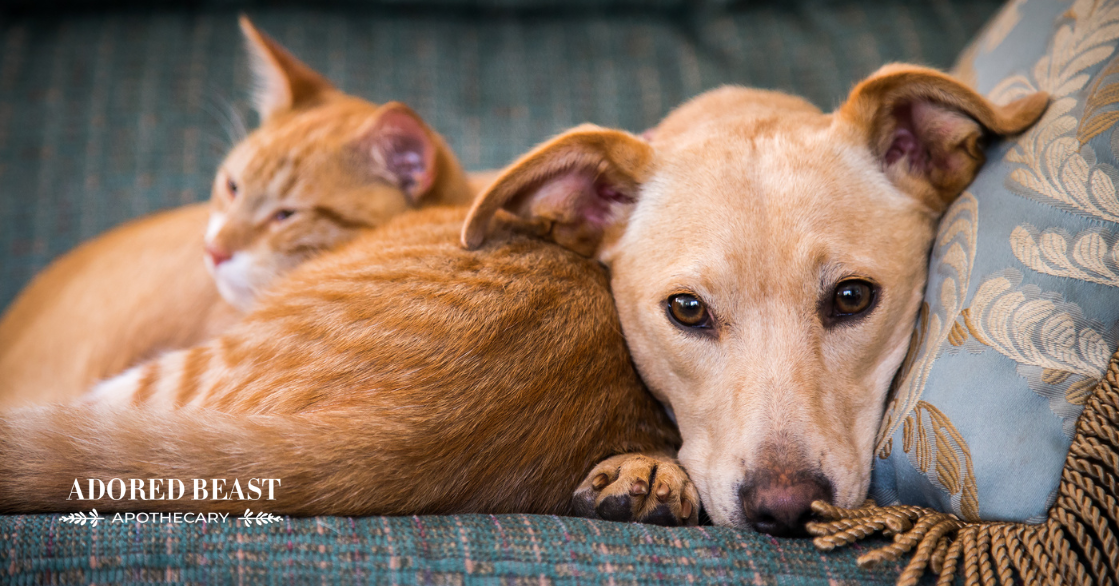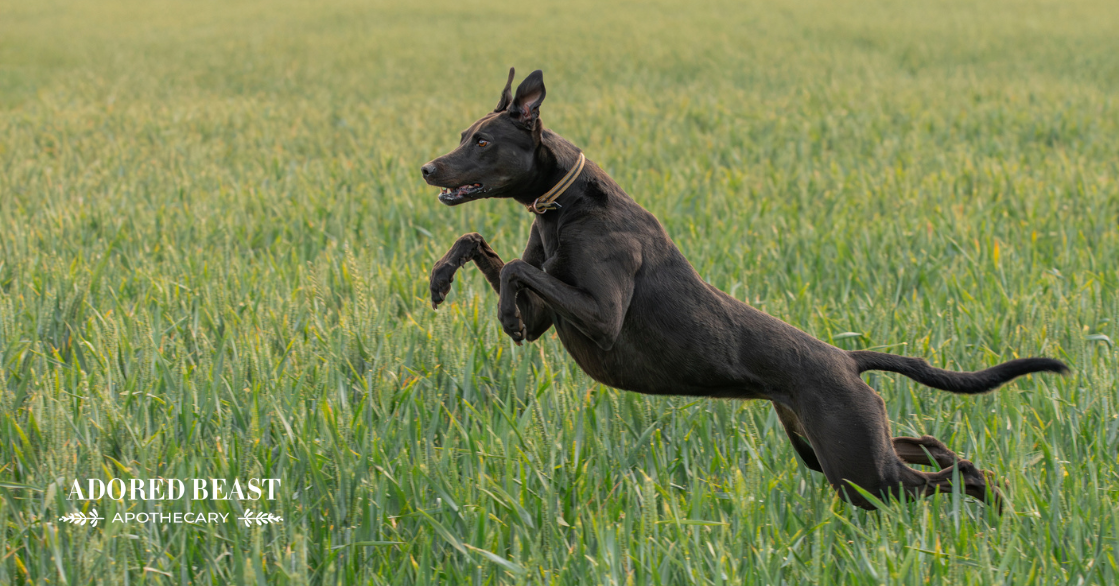Loss is a powerful thing. It affects us in profound ways, and healing is a process that we all go through differently. Losing a loved one is a heartbreaking experience, and for many pet parents, part of the heartbreak comes from seeing signs of grief in dogs and cats (or any animal in the home). Animals form deep bonds with their family members, both human and animal, and when that connection is broken, they can experience grief in their own unique ways.
I’m going to get real here. I have been putting this post off for months because I know it’s going to bring up all the feels (I am crying now as I write this, and I’ve barely started!!). I have seen my animals grieve, and it’s heartwrenching, but knowing how to help them cope made all the difference in the world.
Signs of Grief in Dogs and Cats
When we lost our heart dog Inuk 2 years ago, Indi felt the loss deeply, and it showed. When my sister’s dog, Loki, lost her big brother, Colt, she also grieved, but in some very different ways. And when Julie lost her beloved Henry a few weeks ago, every animal on the farm felt it. In truth, whenever Julie loses an animal on the rescue farm, the others all show signs that they’re dealing with the loss. And you may have experienced other, different signs when your own pet was facing the loss of a friend (animal or human).
Just like humans, some signs of grief in dogs and cats may be subtle, while others are more pronounced. Here are some of the common signs that your pet may be grieving:
Obvious Signs:
- Vocalization – Whining, howling, or meowing more than usual.
- Restlessness – Pacing around the house or repeatedly checking places where their companion used to be.
- Loss of interest in favourite activities – Ignoring toys, playmates, or outdoor time.
- Depressive behaviours – Appearing sad, sluggish, or unresponsive.
- Searching behaviours – Sniffing or looking for the lost companion in familiar places.
Subtle Signs:
- Changes in appetite – Eating less or showing disinterest in food.
- Sleeping more than usual – A sign of emotional withdrawal.
- Lack of enthusiasm – Reduced excitement for walks, playtime, or treats.
- Seeking solitude – Hiding or spending more time alone than usual.
- Increased attachment – Becoming more clingy and seeking more attention, or even develop separation anxiety.
- Accidents – You may notice accidents in the house, or outside the litterbox.
Any behavioural changes in general after a loss can be a sign of grief. With Indi, it was more of a combination of subtle signs, but she also got clingy (and she is not a clingy dog) and a little more anxious on walks. With Loki, she wouldn’t walk more than 500 meters from the house for weeks after. Anything out of the norm could be a result of the grieving process.
How to Help a Grieving Pet
Grief is a natural process, and it’s so easy to say that time will heal, but we know that that’s really just an empty sentiment. Our animals form bonds that even we can’t understand, so their grief process can take a long time, just like ours does. That said, there are ways you can support your pet through this difficult time:
1. Be Patient
This is absolutely the most important thing. If your animal is grieving, chances are you’re also grieving. When we grieve, we are not in the right headspace, but we need to be patient with our animals. Give them space if they need it or snuggles if they don’t. If they have accidents, don’t want to walk, or don’t want to leave their companion’s bed for a few days, never get angry or upset. Be patient and understanding. Don’t force them to “move on” too quickly.
2. Maintain Your Regular Routine
Sticking to a consistent daily routine can help your pet feel safe and secure. Meals, walks, and bedtime should remain as predictable as possible. For our pets, the loss of family member is a huge change, so try not to have other changes added to the mix.
3. Provide Comfort and Reassurance
Obviously, this goes without saying. Spend extra quality time with your pet, offering gentle affection, soothing words, and reassuring touches. As I mentioned, Indi became more clingy after we said goodbye to Inuk, and so we were sure to give her what she needed when she needed it. Let them grieve in their own way while making sure they know they are loved and safe.
4. Encourage Exercise and Play
Physical activity is really important, too. While you may not feel like leaving the house, it can help reduce stress and anxiety for your pet but also for yourself. Providing mental and physical stimulation can help take their mind off their loss and can actually help strengthen your bond. New toys, puzzle feeders, or interactive games can provide a positive focus for their attention. Enrichment activities help prevent withdrawal and encourage engagement with their surroundings.
5. Introduce New Companionship Carefully
We can never replace someone we’ve lost, but for some of us, when we lose a pet, welcoming a newcomer can help with the healing process. Just be aware of how your animal feels, too. After Inuk, it took us 1.5 years to bring Jones home, and we knew then that we were all ready to welcome her. If your pet has lost a friend, wait until they have had time to adjust before introducing another pet. Let them heal emotionally before making major changes to their environment.
6. Consider Natural Remedies
Our physical actions can have a huge impact on how our animals cope with loss, but so too can natural remedies:
- Calming pheromone diffusers can help with calming at home
- Flower essences (like Bach Rescue Remedy) may provide comfort and reduce anxiety
- CBD can help calm axiety as well
- Homeopathic Ignatia amara is specifically indicated for symptoms of grief. Go with a 30C potency once a day
While most pets gradually adjust, some take longer than others. Give your animal time. However, if you notice prolonged depression, refusal to eat, or extreme behavioural changes, you may want to speak with your veterinarian or a behaviourist for advice on other tips to help them cope.
❤️ If you and your animal are dealing with loss, whether recent or not, know that we feel your pain, and we are so sorry for it. We are grieving alongside you. Grief is a process that takes time, but with love, patience, and support, your pet will heal and find joy again. Recognizing the signs of grief in dogs and cats, respecting their emotions, and providing compassionate care will help them navigate their loss and continue living a happy, fulfilling life.












